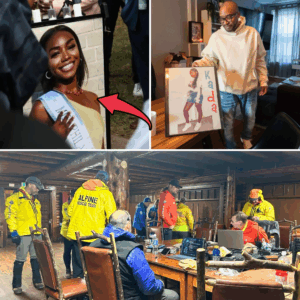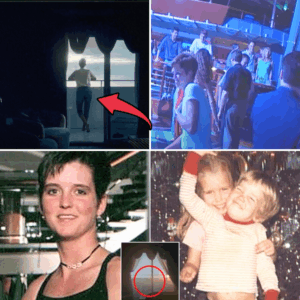The tragic murder of Iryna Zarutska, a 23-year-old Ukrainian refugee, on a Charlotte, North Carolina, light rail train has left the nation reeling, not only due to the brutality of the attack but also because of the harrowing details revealed by witnesses about the moments following the stabbing. On August 22, 2025, Zarutska was fatally stabbed in an unprovoked assault aboard the Lynx Blue Line train, and new accounts highlight the most heartbreaking aspect: she was still alive after the initial attack, but the train did not stop immediately, and passengers, in a state of shock, struggled to provide effective aid, resulting in excessive blood loss that led to her death. This article reconstructs the incident based on surveillance footage, witness statements, official reports, and public reactions, shedding light on the systemic issues that compounded this senseless tragedy.
A Life Full of Promise Cut Short
Iryna Zarutska’s story is one of resilience amid adversity, making her untimely death all the more poignant. Born in Kyiv, Ukraine, in 2002, Zarutska fled her homeland in August 2022 with her mother, sister, and brother to escape the ongoing war with Russia. Settling in Charlotte, she embraced her new life with determination, quickly learning English and enrolling at Rowan-Cabarrus Community College. She worked at Zepeddie’s Pizzeria, where she was remembered as a kind and hardworking colleague. Her passions included art, sculpting, and designing unique clothing, and she dreamed of becoming a veterinary assistant, driven by her love for animals. Neighbors described her as gentle and caring, often looking after their pets, while her family spoke of her vibrant spirit and the safety she sought in America.
On the evening of her death, Zarutska had just finished her shift at the pizzeria and boarded the Lynx Blue Line train at Scaleybark station around 9:50 p.m., likely heading home to text her boyfriend. Wearing her work uniform and AirPods, she sat down in a nearly empty car, unaware that Decarlos Brown Jr., a 34-year-old man with a history of mental illness and criminal activity, was seated behind her. Surveillance footage, released by the Charlotte Area Transit System (CATS) on September 5, 2025, captures the chilling prelude: no interaction between the two, just a routine commute turned nightmare.
The Attack and the Immediate Aftermath
The stabbing was swift and unprovoked. Footage shows Brown, dressed in a red hoodie, fidgeting and muttering before suddenly standing, pulling a folding pocket knife from his pocket, and lunging at Zarutska. He stabbed her three times, including a fatal wound to the neck, as she raised her hands in a desperate attempt to defend herself. Witnesses later described the scene as surreal and terrifying. “It happened so fast; no one could believe it,” one passenger told local media. Zarutska collapsed onto the seat, then slid to the floor, blood pooling around her from the severe neck injury.
The most heartbreaking detail, as recounted by witnesses, is that Zarutska was not immediately dead after the attack. She was still alive, gasping and bleeding profusely, but the train continued moving without stopping at the next station. A bystander, speaking anonymously to CNN, revealed: “She wasn’t dead when he attacked her, but the train didn’t stop, and no one knew what to do to help her, causing her to lose too much blood leading to death.” This account aligns with reports from The Hill, which noted a delay of over one minute and 35 seconds before any passenger approached to assist, possibly due to shock, fear of the armed suspect, or the blood not being immediately visible from all angles.
As the train rumbled on, passengers froze in disbelief. Some turned away, others stared in horror, but initial intervention was delayed. Eventually, a few brave individuals kneeled over her, attempting to apply pressure to her wounds and bandage them with whatever was available—clothing or napkins from their bags. One witness described trying to stem the bleeding from her neck, but the injury was too severe, and without proper medical training or equipment, their efforts were futile. “We tried to help, but the blood was everywhere, and she was fading fast,” another passenger recounted to WCNC, a CNN affiliate. The train’s failure to halt immediately meant precious minutes were lost before emergency services could arrive, exacerbating her blood loss.
The Suspect’s Actions and Arrest
Decarlos Brown Jr. calmly walked to the train door after the attack, still holding the bloodied knife. He discarded his stained hoodie on the platform and left the weapon nearby before being apprehended by Charlotte-Mecklenburg Police Department (CMPD) officers who were already at the station for unrelated reasons. A chilling detail from the footage: as he exited, Brown muttered, “I got that white girl,” adding a potential racial motive to the investigation, though authorities have not yet classified it as a hate crime.
Brown, who has a documented history of schizophrenia and at least 14 prior arrests, including armed robbery and assault, was out on bail at the time. His family revealed he suffered from hallucinations and paranoia, believing “synthetic materials” controlled his behavior. Despite a court-ordered mental health evaluation in July 2025 that was never completed, Brown was free, highlighting glaring systemic failures.
Systemic Failures Exposed
The incident has exposed critical shortcomings in Charlotte’s public transit security and emergency response protocols. The Lynx Blue Line car where the attack occurred had no security personnel, despite officers being present in an adjacent car. CATS confirmed the train operator followed protocol by holding the train once alerted, but witnesses claim the delay in stopping allowed the situation to worsen. “If the train had stopped right away, maybe paramedics could have gotten to her sooner,” one passenger lamented in a statement to ABC News.
Moreover, the lack of fare enforcement—Brown was reportedly fare-jumping—contributed to the vulnerability. In response, CATS announced plans to increase security staffing, install new ticket validators, and enhance fare inspections. City council member Dimple Ajmera criticized the current measures as insufficient, warning that public trust in the transit system is eroding. U.S. Secretary of Transportation Sean Duffy launched an investigation into Charlotte’s transit safety, blaming local officials for failing to protect riders.
The case also underscores issues in the criminal justice system, particularly regarding mental health. Brown’s untreated schizophrenia and repeated releases despite his violent history point to inadequate oversight. Charlotte Mayor Vi Lyles called it a “tragic failure by the courts,” while his mother, Michelle Dewitt, expressed frustration over her unsuccessful attempts to secure an involuntary commitment for him.
Public Outrage and Political Fallout
The release of the graphic surveillance video ignited national outrage, turning Zarutska’s murder into a symbol of urban crime and systemic neglect. Conservative figures, including President Donald Trump, seized on the case to criticize “soft-on-crime” policies in Democratic-led cities. Trump demanded the death penalty for Brown, describing him as a “deranged monster” and Zarutska as a “beautiful young woman seeking peace.” Elon Musk echoed calls to “name and shame” lenient judges and prosecutors.
The racial dynamics—Brown is Black, Zarutska was White—fueled divisive commentary, with some alleging media bias in coverage. Mayor Lyles faced backlash for urging restraint in sharing the video and emphasizing compassion for those with mental health issues, which critics viewed as downplaying the victim’s plight.
A Community Mourns and Seeks Justice
Zarutska’s death has profoundly affected Charlotte’s Ukrainian community and beyond. A candlelight vigil on August 31, 2025, drew hundreds, with another planned for September 22. Her family, devastated, chose to bury her in the U.S., honoring her adopted home. Zepeddie’s Pizzeria issued a statement: “We lost not only an incredible employee but a true friend.” A GoFundMe raised over $75,000 for her family.
Federal charges against Brown, including committing an act causing death on mass transportation, carry a potential death penalty. U.S. Attorney Russ Ferguson, emotional during a press conference, vowed justice: “She was coming home from work like all of us do… This act of terrorism will not stand.”
Lessons from a Tragedy
The heartbreaking witness accounts of Zarutska’s final moments—alive but bleeding out as the train continued and help arrived too late—highlight the need for better emergency training for transit staff and passengers, improved security, and reforms in mental health care within the justice system. As Charlotte grapples with this loss, Zarutska’s story serves as a stark reminder of the fragility of safety in public spaces and the human cost of systemic failures. Her journey from war-torn Ukraine to a tragic end in America underscores the urgent call for change to prevent such senseless violence.




